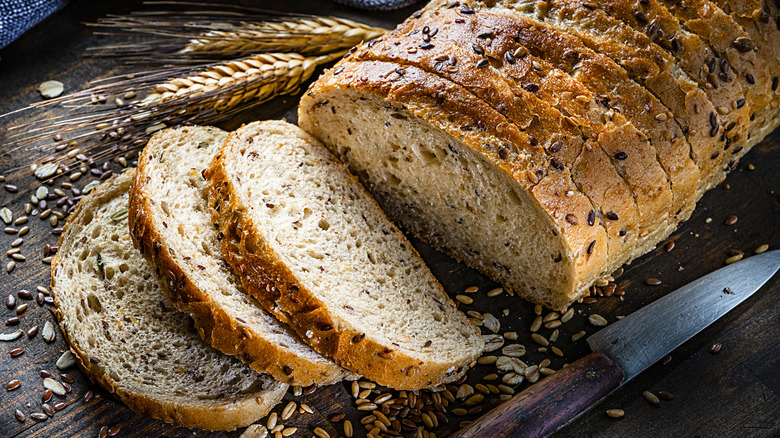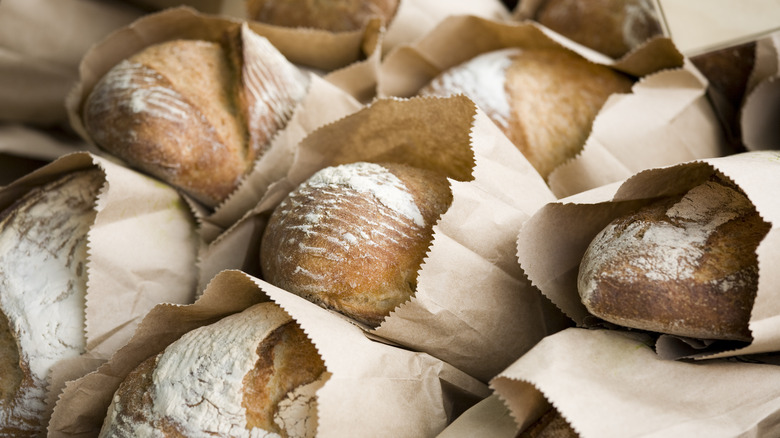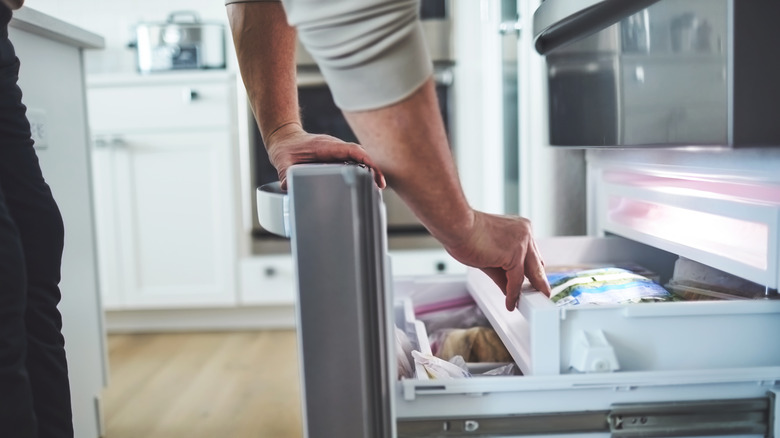Don't Even Think About Storing Fresh Bread In Plastic
Bread has been a part of human history for thousands of years, all around the globe. From sourdough, roti, and focaccia to challah, brioche, and Parker House rolls, for many of us, it's a part of our daily diet.
A fresh loaf of bread, still warm from the oven, is a wonderful thing. Whether it's homemade, or an artisan loaf from a bakery, a thick slice spread liberally with butter is simplicity at its best. And, that's before you even considered all the delicious sandwich and toasted options that are made all the better by using great quality loaves.
But, while fresh bread is arguably more delicious — and healthier — than your average pre-packed, store-bought loaf, it does have one major drawback: its short shelf-life. Without the preservatives and baking enhancers that help to keep grocery store loaves staying fresh for longer, freshly baked bread may only last two or three days before it starts to go stale or moldy. So, is there any way to extend the life of your loaf? To start, don't store it in plastic.
Store fresh bread in paper
When storing fresh bread, the idea is to slow down the processes that cause it to become stale, dry, or moldy to begin with. There are two main ways your fresh bread can turn bad: It can go moldy, due to lack of airflow, or it can go stale, due to dehydration.
While you might assume that wrapping your loaf in plastic would protect it, wrapping bread tightly actually helps to promote the growth of mold, and that's especially true if the environment is particularly hot or humid, say in a refrigerator that emits heat or on a counter near a dishwasher that gets steamy. The hot or thick air results in bread turning bad much faster, according to Madelyn Osten, who once headed up the baking team at a Miami spot called Sullivan Street Bakery.
For these reasons, Osten suggests storing your bread in a paper bag on the counter if you're going to eat it within a couple of days, as well as keeping the cut side of your loaf "as unexposed as possible," as she told Food & Wine, to help retain its freshness. You can do this by using the heels of the bread as "covers" for the cut side.
Freezing bread will help it last even longer
In general, the best way to store bread so it lasts longer is to do so in a cool, dry, dark place. You can store it in a bread box, or wrap it in paper or a linen bread bag if you're planning to eat it quickly. But, what if you know you're not going to finish the loaf within a couple of days, and want to avoid totally wasting it?
Experts like former baker Madelyn Osten agree that storing bread in the refrigerator actually speeds up the process of your bread going stale, as mentioned above, so it's not the best idea to keep it there. The freezer, on the other hand, is a great place to keep any bread you're not going to be using any time soon — and this is the one time you actually can use plastic.
She suggests doing so as either a whole loaf, or individual slices of bread, and putting them into a freezer bag until you're ready to eat. Or, you can try Ina Garten's hack for freezing bread using chunks to avoid freezer burn. You can then defrost a whole loaf overnight in the refrigerator (unwrap it first so you don't create the conditions that would turn it bad), or pop frozen slices straight into the toaster or an oven set to 325 degrees Fahrenheit for 25-30 minutes, and it will be like having fresh bread all over again.



